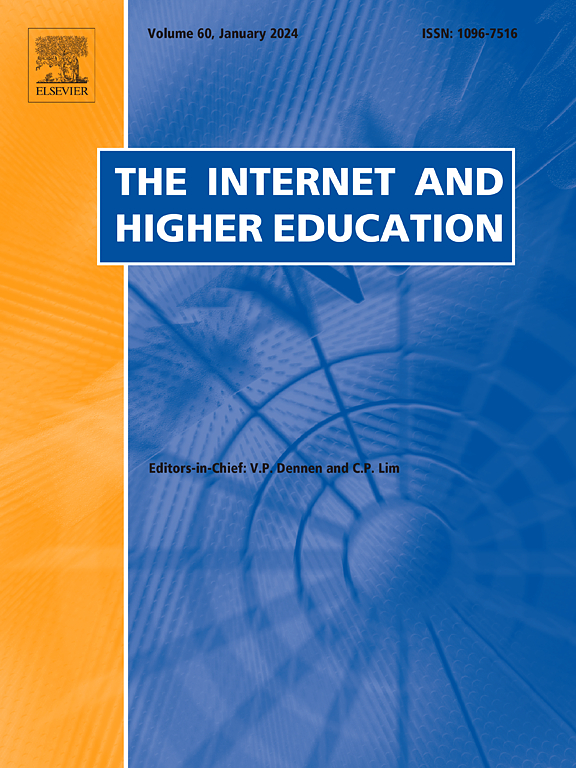平行同理心还是反应性同理心?情感教学主体提供的情感支持在网络学习中的作用
IF 6.8
1区 教育学
Q1 EDUCATION & EDUCATIONAL RESEARCH
引用次数: 0
摘要
本研究旨在探讨情感性教学代理(PA)在网络学习情境下提供平行共情和反应性共情的效果。在2(平行共情:是与否) × 2(反应性共情:是与否)受试者间设计中,122名大学生学习了10个关于判断和决策的心理概念,同时跟踪他们的眼球运动,检测他们的生理觉醒(即心率和皮电活动)。结果发现:(a)情感习得为学习者提供反应性共情,可以增强学习者的生理唤醒,引导学习者更加关注重点学习内容,提高学习者的记忆和迁移绩效;(b)同时提供平行共情和反应性共情的情感性行为比只提供平行共情和反应性共情的情感性行为更能促进迁移绩效;(c)情感性PA既没有增加学习者的外在认知负荷,也没有分散学习者的注意力。综上所述,本研究证实了反应性共情可能是情感PA提供的最重要的共情,并且表明情感PA同时提供平行共情和反应性共情对促进深度学习最有效。研究结果有助于丰富现有理论,并为未来研究者设计情感性PA提供参考。本文章由计算机程序翻译,如有差异,请以英文原文为准。
Parallel empathy or reactive empathy? The role of emotional support provided by affective pedagogical agent in online learning
To increase human-computer interaction and motivate university students' online learning, this study investigated the effects of affective pedagogical agent (PA) providing parallel empathy and reactive empathy in an online learning scenario. In a 2 (Parallel empathy: yes vs. no) × 2 (Reactive empathy: yes vs. no) between-subjects design, 122 university students learned 10 psychological concepts about judgment and decision-making while their eye movements were tracked and physiological arousals (i.e., heart rate and electrodermal activity) were detected. The results found that (a) affective PA that provides learners with reactive empathy could enhance learners' physiological arousal, guide learners to devote more attention to key learning content, and improve retention and transfer performances; (b) affective PA providing both parallel empathy and reactive empathy was more likely to promote transfer performance than those only providing parallel empathy or reactive empathy; (c) affective PA neither increased learners' extraneous cognitive load nor distracted learners' attention. In summary, this study confirms that reactive empathy may be the most important empathy provided by affective PA, and demonstrates that affective PA providing both parallel empathy and reactive empathy were most effective in promoting deep learning. Research findings help enrich prior theories and provide a reference for future researchers to design affective PA.
求助全文
通过发布文献求助,成功后即可免费获取论文全文。
去求助
来源期刊

Internet and Higher Education
EDUCATION & EDUCATIONAL RESEARCH-
CiteScore
19.30
自引率
4.70%
发文量
30
审稿时长
40 days
期刊介绍:
The Internet and Higher Education is a quarterly peer-reviewed journal focused on contemporary issues and future trends in online learning, teaching, and administration within post-secondary education. It welcomes contributions from diverse academic disciplines worldwide and provides a platform for theory papers, research studies, critical essays, editorials, reviews, case studies, and social commentary.
 求助内容:
求助内容: 应助结果提醒方式:
应助结果提醒方式:


